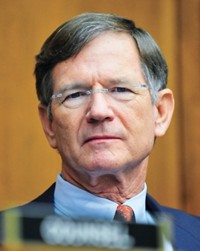Advertisement
Grab your lab coat. Let's get started
Welcome!
Welcome!
Create an account below to get 6 C&EN articles per month, receive newsletters and more - all free.
It seems this is your first time logging in online. Please enter the following information to continue.
As an ACS member you automatically get access to this site. All we need is few more details to create your reading experience.
Not you? Sign in with a different account.
Not you? Sign in with a different account.
ERROR 1
ERROR 1
ERROR 2
ERROR 2
ERROR 2
ERROR 2
ERROR 2
Password and Confirm password must match.
If you have an ACS member number, please enter it here so we can link this account to your membership. (optional)
ERROR 2
ACS values your privacy. By submitting your information, you are gaining access to C&EN and subscribing to our weekly newsletter. We use the information you provide to make your reading experience better, and we will never sell your data to third party members.
Environment
Unequal reporting
October 30, 2006
| A version of this story appeared in
Volume 84, Issue 44
I read with great interest the reports involving platinum and breast implants (C&EN, July 31, page 13; Anal. Chem. 2006,78, 5240). The work in question is highly controversial, directly related to public policy, and appears to be outside the mainstream. Regardless of the specific issues involved with that work, the ACS publications maintained a professional manner and treated the authors of the suspect work with respect. The criticisms by those questioning the work were also measured and professional.
That is why I am perplexed by ACS's attitude with regard to an article published last year in Environmental Science & Technology involving statistical issues surrounding some climate studies (ES&T Online, Business and Education News, Aug. 31, 2005). Stephen McIntyre, a retired businessman with a mathematics background, is the subject of that article. He has been questioning some statistical techniques used by paleoclimatologists. Those techniques have resulted in claims that the 1990s was the warmest decade of the past millennium. McIntyre succeeded in getting his criticisms published in the peer-reviewed journal Geophysical Research Letters.
The ES&T article repeated some very unprofessional comments aimed at McIntyre by members of the climate research community.
Without getting into the details of somewhat arcane statistical practices, suffice to say that McIntyre's criticisms were partially upheld by a recent panel of the National Academy of Science's National Research Council. In addition, his work was validated by an ad hoc team led by Edward Wegman of George Mason University, who is also the chair of the NAS Committee on Applied & Theoretical Statistics. The NRC committee, which included a number of climate scientists, specifically agreed with McIntyre's criticism that tree-ring data from certain tree populations were unreliable for deriving climate reconstructions. Both teams were commissioned by Congress, and McIntyre has testified in front of Congress on the same issue.
For three months now, I have exchanged a series of phone calls and e-mails with ACS about the ES&T article. At the end of it all, ACS stands behind the tone and substance of the ES&T article. It seems that the type of errors alleged in the breast implant study are worthy of balanced and professional reporting, and I applaud ACS in this regard. I do not think a critic of a climate-change study—whose criticisms have now been found to have merit—should be pilloried in the pages of an ACS publication.
John A. Marsella
Allentown, Pa.
Rudy Baum replies:
Paul Thacker was the associate editor at ES&T who wrote the article John Marsella is objecting to. I reviewed the article when Marsella first contacted ACS about it and concluded that Thacker's reporting conformed to accepted journalistic standards maintained at all ACS news publications. What Marsella characterizes as "unprofessional comments" were quotations from climate scientists Thacker talked to who were exasperated that a paper by a nonscientist that appeared in a non-peer-reviewed journal would receive the kind of attention it did from the Wall Street Journal and a Texas congressman.



Join the conversation
Contact the reporter
Submit a Letter to the Editor for publication
Engage with us on Twitter